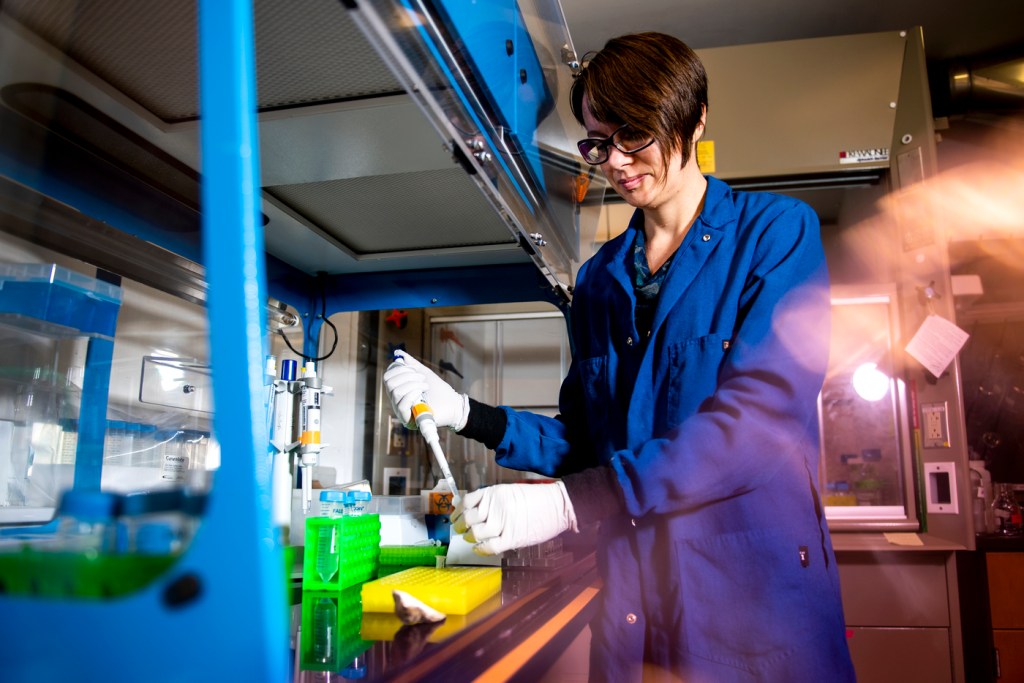Can computer models help restore marine life affected by climate change?

Katie Lotterhos is helping breed better oysters. Not just ones that taste better (although, that’s part of it), but importantly, ones that will be better suited to stave off disease and survive in warmer, saltier, and more acidic waters.
She, along with her colleagues, are doing it by searching for miniscule variations in the genetic makeup of certain oysters then using computer models to predict how those differences will help or hinder the bivalves in complex, changing environments.
“We can breed oysters that will be more resistant to disease, but how will they react to other stressors in their environments? There’s a need to understand how genomes affect how an organism performs against a number of variables,” says Lotterhos, associate professor of marine and environmental sciences at Northeastern.

Lotterhos is helping breed better oysters. Not just ones that taste better (although, that’s part of it), but importantly, ones that will be better suited to stave off disease and survive in warmer, saltier, more acidic waters Photo by Ruby Wallau/Northeastern University
Her work has wide-ranging consequences, and not just for fans of the half shell.
As the planet’s oceans warm and become more acidic, aquatic species are racing to keep up. Some populations are migrating to new waters, adapting to new food sources, or simply dying off.
But humans may be able to help restore marine populations by moving them to more suitable environments or breeding for traits that enable them to survive on their own.
“Climate change is happening so quickly that some scientists are concerned that certain species won’t be well-suited to their environments in the future,” Lotterhos says. “But while an oyster in the North may not end up being suited to live in the North anymore, perhaps an oyster in the South would do well in the North.”
Lotterhos and her colleagues are specifically focused on the eastern oyster, Crassostrea virginica, which ranges from the Atlantic coast of Canada to the Gulf of Mexico. While these shellfish are all the same species, they have different adaptations depending on the region where they are found, Lotterhos says. Animals in the south may be better able to handle warm water, while those growing near the mouths of rivers might be adapted to water with less salt in it.
She hopes her modeling techniques will enable scientists to select oysters with specific genetic information that will give them the best chance of success—and survival.
For her work, Lotterhos recently received two prestigious awards: a CAREER award from the National Science Foundation, and a Fulbright scholarship.
The CAREER award is one of the highest honors given by the U.S. government to young faculty members in engineering and science. Awards are given to faculty with “the potential to serve as academic role models in research and education and to lead advances in the mission of their department or organization.”
And the Fulbright will enable her team to study oyster populations in the Baltic Sea off Sweden—known as a “time machine for the future ocean,” Lotterhos says, a reputation it received for its early history of warming and other stressors that forced scientists to test out novel methods for restoring aquatic populations.
“These awards signal that she is a true and emerging leader in her field,” says Geoffrey Trussell, chair, director, and professor of marine and environmental sciences at Northeastern. “These are very prestigious awards and the competition for them is so keen that Katie’s success speaks volumes regarding how much the scientific community values her research.”
For Lotterhos, the recognition is more motivation to keep going.
“Climate-change work can feel hard because it’s really challenging to get the whole world on the same page,” she says. “But the way I think about it is that it’s a process, and we’re just constantly trying to work toward a bunch of different goals related to solving these issues. Ultimately that’s what we need to do.”
For media inquiries, please contact media@northeastern.edu.




